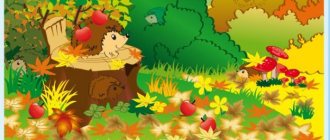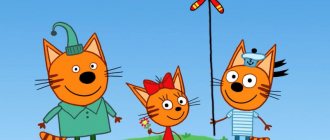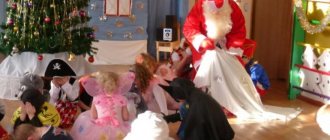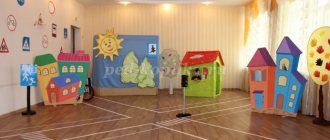Summer fun with water in kindergarten. Senior group
Scenario for summer fun with water on the street for older children
Goal: to show the enormous importance of water for all living beings. Objectives: - clarify children’s ideas about different states of water, - create a joyful mood in children, - develop the ability to solve riddles. Previous work: playing with water, observing rain, ice, snow, talking about water, the states of water, how water helps a person, reading and looking at illustrations on the topic “Water”. Equipment: two buckets, two bottles, two funnels, two glasses, two umbrellas, soft shampoo bottles (shower gels), “droplets” emblems for awards (small and large). Entertainment takes place in the kindergarten area.
Progress of the entertainment
Queen Water enters Hello, guys. Do you recognize me? Probably not. I am needed in heaven and on earth; no one and nothing can do without me. I am needed by everyone, everyone, everyone. For some, to swim, for others, to quench their thirst, for others, to wash something, and for housewives, to cook different dishes! Who am I? I Children: Queen Water! Queen Water: Do you guys know who needs water and why? Answer my questions, and for the correct answer you will receive a “drop” of water, and whoever collects the most “drops” will win today. Who can't live without water? (people, plants, animals, birds)
Why do plants and animals need water?
(to live and grow)
What do people do with water?
(cook dinner, drink, bathe, wash, wash, water)
Where on earth is water found?
(in seas, rivers, lakes, oceans, streams, in puddles)
.
Is there water in the sky? Where? (there are: in clouds, in clouds, in snowflakes, fogs) Queen Water: Well done, guys. Everyone said it correctly: plants need to be watered, otherwise they will dry out, animals need to drink water, and some, for example, fish, live in it. People need water constantly: to drink, bathe, wash, wash, harden and relax near water. No living creature can survive without water. I am the Queen on earth and in heaven. Queen of all nature. On earth I am in the seas, oceans, and rivers, and I am also underground in wells and springs. People know that spring water is the cleanest, most delicious and healthy, and when they come to the spring, people get clean water for themselves. So you and I will now fill our bottles with clean spring water. A relay race “Fill the bottle with water” is being played. Two teams take turns filling glasses of water from buckets through a funnel into bottles at the other end of the site. Whoever fills the bottle first wins. Members of the winning team are awarded “drops”. Queen Water: But I am also in the sky when clouds are crawling across it. Come on, who can tell me about heavenly water? (two children come out and read poems about rain) Child 1: - Rain. rain, what are you pouring? Won't you let us go for a walk? - I am the rainwater of my land, mine, mine. My street and yard, My roof and fence, I wash the gate, And the trees and bushes, So that by May Day everyone will be washed and clean! Child 2: Rain, rain, water, There will be a loaf of bread, Rain, rain, let the peas grow! Queen Water: Well done guys, good poems about rain. Here are my “drops”. And I have a suitable game for the guys: “Umbrellas”. A relay race game “Umbrellas” is being held . Two teams, two umbrellas. A child with an umbrella runs to the pin at the other end of the court and returns back with his back, passing the umbrella to the next player. Members of the winning team are awarded “drops” Queen Water: Oh, how dexterous and skillful you are. Do you like to solve riddles? Just remember that all my riddles are related to water (whoever guessed the riddle - “droplet”) Riddles 1. Without a path and without a road The longest-legged one walks, He hides in the clouds, in the darkness, Only his feet on the ground (rain)
2. Without boards, without axes, The bridge across the river is ready. The bridge is like blue glass, Slippery, fun, light!
(ice)
3. It grows upside down, It grows not in summer, but in winter, But the sun will bake it, - It will cry and die
(icicle)
4. Stars fall from the sky, They will lie on the fields, Let the Black Earth hide under them.
Many, many stars Thin as glass, The stars are cold, But the earth is warm (snowflakes)
5. Fluffy cotton wool floats somewhere.
Here is the cotton wool below - and the rain is closer (clouds) Queen Water: Yes, guys, all these natural phenomena - snowflakes, icicles, ice, clouds - are also associated with water. Ice and icicles are frozen water, snowflakes are frozen rain, and clouds are droplets of water flying across the sky. (a child comes out and recites a poem about clouds) Child 3: Clouds, clouds - Curly sides, Curly clouds Whole, holey, Light, airy - Obedient to the wind. I'm lying in a clearing. I'm looking at you from the grass. I lie there, dreaming: Why don’t I fly Like these clouds? Child 4: Clouds to any country Through mountains, oceans They can easily fly: Higher, lower - whatever you want! On a dark night - no fire! The sky is all free for them And at any time of the day. (the teacher gives each child a “drop”) Queen Water: And now we’ll play. Guess the riddle: I run as if on a flight of stairs, Jingling over the pebbles, You will recognize me from afar by the song. (stream)
Our game is called “Stream.”
The teacher plays the game “Stream.” Children stand in a column of two. they make “collars”, the child without a partner passes through the collars, and, choosing a mate, stands at the end of the column. The child left without a partner repeats everything all over again. Queen Water: How well our water festival went! And in conclusion, let’s count the best “water” connoisseur (“droplets” are counted, the winner gets a “big drop”, maybe 2-3 winners with the same number of “droplets”) Queen Water: And at the end I have a surprise for you - “living fountains” " You guys have probably seen how fountains work, how beautifully the jets of water shoot up. On a hot day, it is very pleasant to be near the fountain: it gives off coolness, and the drops of water sparkle in the sun. Take each of you a bottle (the teacher goes around the children with a basket of empty bottles, the caps of which have small holes made in advance)
and fill them with water in the area.
We will launch our fountains in the kindergarten area, in our main flower bed - let our flowers become even more beautiful! Children go out to the site and the game of “fountains” continues.
We recommend watching:
Scenario of summer entertainment for older preschoolers in kindergarten Summer entertainment for Children's Day in kindergarten in the senior group Summer entertainment in kindergarten in the senior group. Scenario “Hello, Red Summer!” Entertainment "Flower Glade". Senior group. Scenario
Similar articles:
Summer theatrical entertainment in kindergarten in the senior group
Summer fun travel scenario in kindergarten for older children
Scenario of summer entertainment for the International Friendship Day. Senior group
Scenario of a summer play program for children 5-6 years old on the street
Holidays in the pool. Scenarios for children's entertainment on the water
The water element irresistibly attracts children of any age into its tender embrace. How to make swimming pool activities even more enjoyable and interesting for children is described in the publications in this section. It brings together the rich and varied experience of teachers in organizing all kinds of holidays, entertainment and leisure activities on the water.
Evaluate a wide selection of ready-made scenarios and notes for holding such events, look at photo reports about their implementation. Many original developments and interesting solutions from colleagues are worth taking note of. We swim, play and develop with pleasure!
Holidays in the pool and children's water activities for every taste.
Showing publications 1-10 of 354. All sections | Holidays in the pool. Scenarios for children's entertainment on the water
"Cruise". Scenario of sports entertainment in the pool for the second junior group. Sports entertainment in the pool for the second junior group. Conducted by: Kuznetsova A.A. physical education instructor Venue: MDOU "CRR - kindergarten "Smile"
.
Age of children: II junior group. Duration of entertainment : 20 minutes.
Objectives: 1. Create a positive one. Scenario of leisure time on the water “April Fool’s Day. April 1st!” Scenario of the holiday on the water “April Fool’s Day”
“I don’t trust anyone on April 1!” Host: Hello friends, we are celebrating the New Year! We wish you happiness and joy! Children: no, no, no Presenter: how not? February 23? March 8? Yes, of course I’m pike, because today is a day of jokes and laughter! Presenter: The roof is dripping.
Summary of the holiday on the water “Across the seas, waves and oceans”
Goal: To promote the development and popularization of physical education and health work, the promotion of a healthy lifestyle, the involvement of preschool children in systematic swimming lessons, the preservation and strengthening of their health. Objectives: • To evoke positive emotions in children, joy from water relay races, and to develop communication skills. • To develop the ability to control one’s body in an unusual environment, to train children in immersing themselves in water with their heads. • Develop motor ability in water. Improve children's ability to play ball on the water.
“Holidays on the water as a means of teaching children to swim”
Since ancient times, swimming has been inseparable from diving, jumping into the water and various games and entertainment in the water. The first swimming competitions were held in Ancient Greece. The ancient Greek writer and traveler Pausanias points out that the program of annual holidays in Hermione included music and swimming competitions. Swimming was also included in the Isthmian Games program as one of the exercises.
To teach swimming to preschool children, so that future swimmers can later win and maintain victories at world championships, as well as successfully perform at the Olympic Games or European Championships, it is advisable to prepare and hold sports events on the water. They allow you to maximize your inner educational resources and provide children with many joyful and happy moments when communicating with children and adults.
Main goals
conducting research on this issue are:
— training and consolidation of swimming skills;
— comprehensive and harmonious development of children;
- identifying talents and creative activity, as well as improving the character of preschoolers.
Main goals
:
1) health promotion, hardening, formation of correct posture;
2) acquisition of vital knowledge, skills and abilities in swimming techniques, self-control, hygiene;
3) improving strength and endurance;
4) fostering discipline and determination.
I set these goals and objectives for myself because... holidays are a means of teaching preschool children to swim, and preparation for them is carried out in the process of swimming lessons, exercises on land (dry swimming), games and entertainment on the water, as well as in the process of an individual approach to children.
Holidays on the water are, first of all, a form of active recreation for children, a source of joy, fun and beauty. At the same time, during the holiday, the child’s ability to demonstrate his physical qualities in unusual conditions and game situations and to mobilize his strength in competitions is revealed. Also, holidays on the water have an effective impact on the formation of a child’s personality and the cohesion of the children’s team; The competitive nature of games and exercises at the holiday helps to develop children's sense of purpose, perseverance and resourcefulness, courage, determination and other moral and volitional qualities. Participation in holidays helps children to better understand the importance of systematic swimming exercises to achieve the desired results, awakens interest in regular swimming lessons, and arouses in children the desire to learn to swim.
The main way to raise a good mood and perform high-quality motor exercises in water is play. When teaching swimming to preschool children, I use a variety of forms - game exercises, fun games, plot and non-plot games, games with elements of competition, relay races.
When choosing games and methodological techniques, I take into account the age of the children and their number in the group, physical fitness and degree of proficiency in the proposed movements. I select movements that are simple and accessible to children. When playing games with children of any age, I almost always take part in them; children really like it and give them a positive charge of energy.
I use games
:
- Games to familiarize yourself with the properties of water: “Small and big legs”, “Fish are frolicking”, “Waves on the sea”, etc. - younger and middle age; “Seine”, “Crucian carp and carp”, “Carousels”, etc. - older age.
- Games with immersion in water with your head: “Count your fingers”, “Pump”, “Let's hide under the water” and others - middle age; “Hunters and Ducks”, “Pump”, “Tag” - older age.
- Games with eye opening in water: “Get a toy”, “Count your fingers”, “Brave guys”, etc. - junior and middle groups.
- Games with exhalation into the water only for older groups: “General breathing”, “Frisky ball”, “Brave guys” and others.
- Games with sliding and swimming: “Train into the tunnel”, “Floating arrows”, “Dolphins”, etc. - senior and preparatory groups.
- Game exercises: “Crocodiles”, “Crabs”, “Herons”, “Riding in circles” - junior and middle groups; “In tow”, “Float”, “Medusa”, “Torpedo”, “Ball in a circle”, etc. - senior and preparatory groups.
The game improves previously learned exercises and technical elements. In each game, all participants receive active physical activity. And also all participants know in advance the conditions of the game: rules, tasks, location, etc. And I make sure to tell older kids the results of the game as well as the entire lesson.
In my practice, in addition to standard manuals, I also use different types of non-standard equipment that I made with my own hands, these are:
- visual landmarks cut out of old inflatable circles in the shape of geometric shapes and sea inhabitants;
- sinking toys made from kinder surprises and other available materials;
— dividing paths for fencing places in the pool from Kinder surprises;
— tubes for breathing exercises in water made from broken hoops;
— jugs for catching fish (toys) for use at parties (competitions for parents and children).
I also sewed costumes for mermaids and fish for synchronized swimming during the holidays.
For the purpose of efficiency and increasing the motor density of classes, all equipment and toys are located in a place accessible to children. The use of various equipment and maximum use of usable space improves the quality of children’s general physical fitness and helps to increase motor activity during swimming lessons, accelerating the process of mastering swimming skills.
The modern approach to the development of children's creativity is characterized by the desire to find effective ways of personal development in conditions of integration, the interconnection of different types of children's activities, such as swimming, music, and the cognitive environment. As a means of developing children's creative abilities, I use training in the elements of synchronized swimming in older groups.
When preparing compositions, children develop motor imagination, develop a sense of beauty and rhythm of movements, and a sense of collectivism. To achieve results in synchronized swimming, we develop swimming skills, the ability to act coherently, and show creativity in transforming and decorating compositions.
When learning compositions, I use the principle of stages, and compose them taking into account the skills and abilities of the children. At stage 1, I select simple exercises and melodic music without changing the rhythm. Movements are taught using counting and signals, and then children count to themselves. I compose compositions with the same exercises for all participants. At stage 2, we learn the exercises in a comprehensive manner, 2-3 different tasks simultaneously with counting and music. We learn elements both with holding the breath and with exhalation into the water; with and without objects. At stage 3, the exercises are taught to the music. I show or explain the exercise, and the children perform it to the music. I take on more complex exercises with flips, without getting up on my feet, etc. I use more formations and include different swimming styles. I also use the entire pool space.
I include all the tasks, compositions (elements of synchronized swimming), exercises and games used in classes that the children have mastered well, in the holiday scenario.
When preparing holidays, I take a differentiated approach:
- This is work with parents, which is carried out not only in the process of preparing for the holidays. Many parents, fearing that their child may get sick while visiting the pool, do not allow him to swim. I have to convince such parents, I conduct individual conversations with them, consultations: “Water gives health”, “Every person should be able to swim”, “Raising healthy children”, “Teaching children not to be afraid of water”; I speak at parent meetings: “Principles of teaching children to swim”, “Water games”, “Adaptation of children to activities in the pool. Exercises for adults and children”, “About the benefits of swimming”. We invite parents to open classes where they see that children enjoy being in the water. Open classes are also beneficial for children. So there are children who began to do exercises in the water more boldly, others, because their parents liked the activity, began to systematically go to the pool. When preparing for the holidays, parents help in making costumes for their children, and also take part in the holidays (competitions) themselves. I design photo exhibitions for parents: “Learning to swim”, “We are very friendly with water - everyone wants to be healthy!”; I also conduct holidays and sports competitions on the water: “Neptune has come to visit us”, “Fast and nimble”, “Water adventures”, “Fun starts”, etc.
- Individual work with children, which is also carried out during classes and rehearsals. During classes, I pay a lot of attention to those children who are unable to do this or that movement. If a child finds it difficult to complete an exercise, I use a demonstration, either I do it myself or the child who succeeds in the exercise, I accompany the demonstration with an explanation.
- Working with teachers, music directors, nurses, etc. We select music for the holiday, as well as for synchronized swimming, where we learn the movements first on land without music, then on land with music, then with music in the water.
- In the process of preparing for the holidays: conducting classes, exercises on land, various physical education activities, the child’s body is hardened. Thus, the health of children improves and the incidence of illness decreases.
A holiday on the water should be a real holiday for children.
When organizing a holiday, I try to make sure that the children all together or one by one in teams participate in different numbers of the program, help the presenters and judges.
Preparations for the holiday begin in advance and are carried out systematically. It is carried out by the entire kindergarten staff and parents.
I draw up a holiday script in advance. Its final approval occurs approximately 2 weeks before the holiday, when the number of participants, the program of acts and the presenter are determined. We plan the content of children's performances taking into account the preparedness, interests and inclinations of preschoolers. On this basis, I compose dramatizations, select entertainment, texts, and prepare costumes. When assigning roles, we take into account the appearance and character of each child, and the child’s ability to enter into a particular image.
The preparation of children for the holiday is carried out gradually, so that there is no need for repeated mass rehearsals, i.e. during classes. In relay races, games, and competitions we use motor tasks known to children.
In order for the holiday to take place smoothly, without delays, and to bring aesthetic pleasure to the performance participants and spectators, I very carefully think through the details of its organization and design. Every adult clearly knows his responsibilities at the holiday. Teachers help in preparing costumes, decorating the pool, preparing invitation cards for parents with the children, preparing prizes, certificates, diplomas and gifts for the winners, while involving the parent committee. I spend holidays 2-3 times a year, duration is 40-45 minutes.
When developing a scenario for a holiday on the water, I adhere to a certain order of its implementation:
— opening of the holiday, parade of participants;
-demonstration performances of festival participants (synchronized swimming);
- the entertainment part of the holiday with the participation of all children and adults present in comic attractions, performances, comic jumps;
-games and relay races for festival participants (or teams);
- a “surprise moment” of a holiday on the water, helping to create a good mood and maintain interest;
-closing of the holiday, summing up the results, awarding (possibly in a solemn atmosphere close to the ritual of the Olympic Games) - depending on the theme of the holiday.
I will definitely try out the equipment and supplies at the place of use.
In the artistic design of water festivals, I provide original and colorful costumes for the participants, decoration of equipment and the entire venue of the festival.
When preparing for the holidays, children have a desire to perform this exercise better than they did it before; there is a desire to swim as far as possible. As a result of the work carried out, we can conclude that holidays stimulate children’s desire to learn to swim, master the skills and abilities provided for by the program, i.e. motivation.



